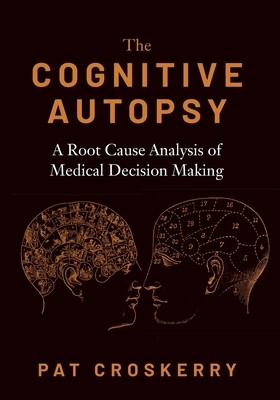
- We will send in 10–14 business days.
- Author: Pat Croskerry
- Publisher: Oxford University Press, USA
- ISBN-10: 0190088745
- ISBN-13: 9780190088743
- Format: 17.5 x 25.2 x 1.8 cm, softcover
- Language: English
- SAVE -10% with code: EXTRA
Reviews
Description
Behind heart disease and cancer, medical error is now listed as one of the leading causes of death. Of the many medical errors that may lead to injury and death, diagnostic failure is regarded as the most significant. Generally, the majority of diagnostic failures are attributed to the clinicians directly involved with the patient, and to a lesser extent, the system in which they work. In turn, the majority of errors made by clinicians are due to decision making failures manifested by various departures from rationality. Of all the medical environments in which patients are seen and diagnosed, the emergency department is the most challenging. It has been described as a "wicked" environment where illness and disease may range from minor ailments and complaints to severe, life-threatening disorders.
The Cognitive Autopsy is a novel strategy towards understanding medical error and diagnostic failure in 42 clinical cases with which the author was directly involved or became aware of at the time. Essentially, it describes a cognitive approach towards root cause analysis of medical adverse events or near misses. Whereas root cause analysis typically focuses on the observable and measurable aspects of adverse events, the cognitive autopsy attempts to identify covert cognitive processes that may have contributed to outcomes. In this clinical setting, no cognitive process is directly observable but must be inferred from the behavior of the individual clinician. The book illustrates unequivocally that chief among these cognitive processes are cognitive biases and other flaws in decision making, rather than knowledge deficits.EXTRA 10 % discount with code: EXTRA
The promotion ends in 18d.05:32:36
The discount code is valid when purchasing from 10 €. Discounts do not stack.
- Author: Pat Croskerry
- Publisher: Oxford University Press, USA
- ISBN-10: 0190088745
- ISBN-13: 9780190088743
- Format: 17.5 x 25.2 x 1.8 cm, softcover
- Language: English English
Behind heart disease and cancer, medical error is now listed as one of the leading causes of death. Of the many medical errors that may lead to injury and death, diagnostic failure is regarded as the most significant. Generally, the majority of diagnostic failures are attributed to the clinicians directly involved with the patient, and to a lesser extent, the system in which they work. In turn, the majority of errors made by clinicians are due to decision making failures manifested by various departures from rationality. Of all the medical environments in which patients are seen and diagnosed, the emergency department is the most challenging. It has been described as a "wicked" environment where illness and disease may range from minor ailments and complaints to severe, life-threatening disorders.
The Cognitive Autopsy is a novel strategy towards understanding medical error and diagnostic failure in 42 clinical cases with which the author was directly involved or became aware of at the time. Essentially, it describes a cognitive approach towards root cause analysis of medical adverse events or near misses. Whereas root cause analysis typically focuses on the observable and measurable aspects of adverse events, the cognitive autopsy attempts to identify covert cognitive processes that may have contributed to outcomes. In this clinical setting, no cognitive process is directly observable but must be inferred from the behavior of the individual clinician. The book illustrates unequivocally that chief among these cognitive processes are cognitive biases and other flaws in decision making, rather than knowledge deficits.

Reviews